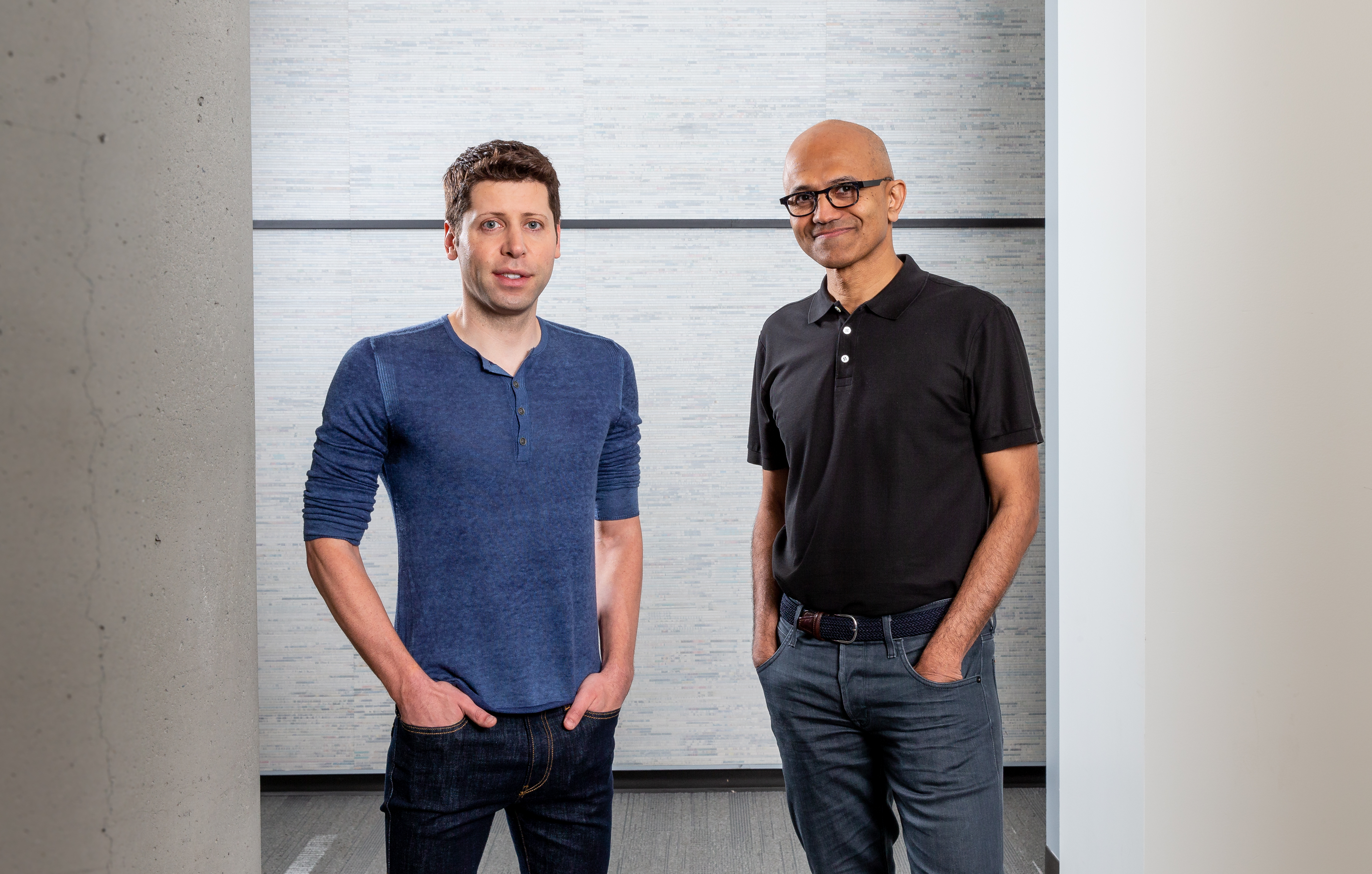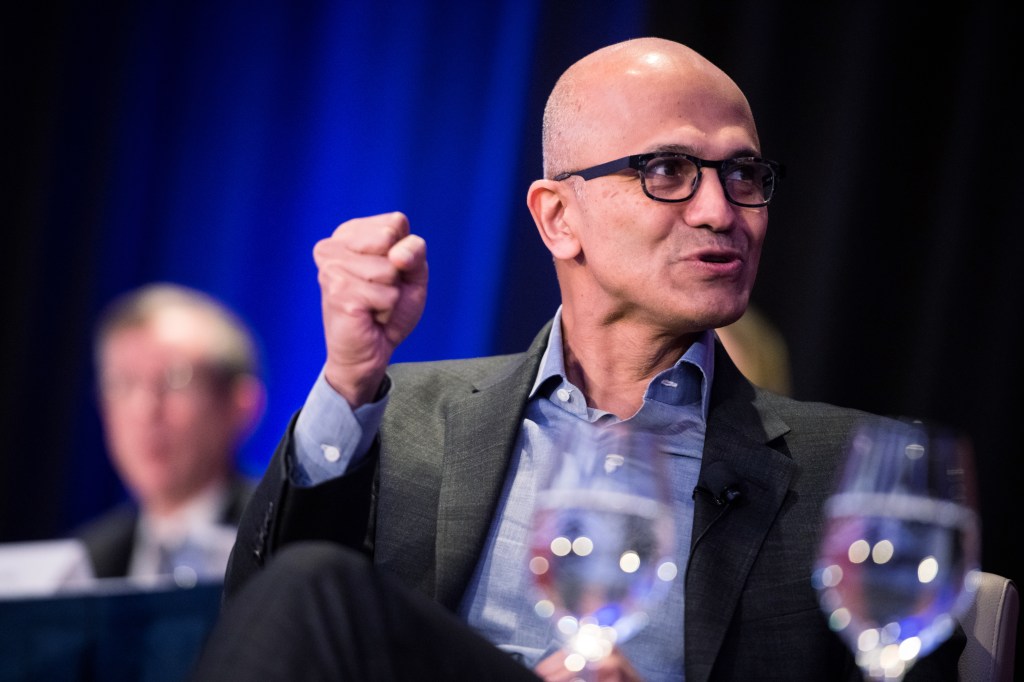In case you weren’t sure how Microsoft felt about AI, CEO Satya Nadella is here to tell you: they like it. They like it a lot. In the company’s annual report, he pens a letter to shareholders bigging up AI in every way. And it’s not hard to see why: He clearly believes this is the biggest, perhaps the only advance in computing that has truly mattered in over a decade.
Though Microsoft’s business is sound, you could be forgiven for thinking they’ve been spinning their wheels somewhat. Their bids to get into mobile, search and hardware have all either stalled or fallen flat, and numerous product experiments have failed to penetrate their respective markets.
On the other hand, their cloud business is very strong, and they’ve increasingly shaped the company and its products around that premise. But even that success was beginning to wear thin, for as profitable as it is, there is only so much room for innovation there.
For years they must certainly have kept an eye on the trends, watching to see whether they some new development or another was worth adopting. Social web? Nah — too much work. Fitness? Simpler to be their infrastructure. Blockchain? Redundant and risky. Metaverse? Very funny.
Like a surfer in a calm, Microsoft waited, placid and bobbing. Then the AI wave rose up under them — and they started paddling for dear life.
Right place, right time
As Nadella writes in his annual letter:
This next generation of AI will reshape every software category and every business, including our own. Forty-eight years after its founding, Microsoft remains a consequential company because time and time again—from PC/Server, to Web/Internet, to Cloud/Mobile—we have adapted to technological paradigm shifts. Today, we are doing so once again, as we lead this new era.
Then follows a couple dozen examples of where AI is being slotted into place across all their business units, products and long-term efforts. This isn’t a hobby for Microsoft — they have actually decided that this is the next phase of personal and business computing.
And it’s not merely an enabler, either, like a silicon advance that makes data centers run twice as efficiently, or a battery that lasts twice as long. It is, so to speak, a transformer:
The long arc of computing has, in many ways, been shaped by the pursuit of increasingly intuitive human-computer interfaces—keyboards, mice, touch screens. We believe we have now arrived at the next big step forward—natural language—and will quickly go beyond, to see, hear, interpret, and make sense of our intent and the world around us.
You can almost see the stars in his eyes: Imagine being at the head of a major tech company like Microsoft during an upheaval of this magnitude! They’ve dabbled with the idea of moving past the mouse and keyboard before, but so far their natural language interfaces (like Cortana) and alternative hardware (like HoloLens) have not risen past the level of parlor tricks.
But by either good fortune or foresight they happened to have backed the breakout leader in natural language AI: OpenAI. Not only does the technology actually look like a genuine game-changer, but the way the cookie crumbled put them in a fair way to give perennial rival Google a black eye. Google, for its part, has been caught flat-footed by the rapid shift to AI, despite having internally created the concepts that enabled it. They’re trying to bounce back, but the company has always struggled to rally successfully behind a unifying concept, and this time may prove no different.
This alliance between Microsoft and OpenAI is freeing for both. OpenAI gets a combination investor and customer with effectively bottomless pockets and a sincere desire to integrate AI tools into every corner of its business. Microsoft is spared the embarrassing necessity of appearing — as it actually is — far behind the curve in AI development, because it can simply present the market-leading product as its own. Nadella makes no mention of Microsoft training its own foundation models, though they are likely doing so quietly to hedge against treachery, because their efforts pale in comparison to the forward momentum of its partnership.
Imagine if the situation was reversed and it was Google who had made a fortuitous deal with OpenAI, leaving Microsoft out in the cold. Microsoft would be even worse off than Google, having to scramble to build LLMs a fraction as good, and every month they spent trying to catch up saw their competitor score another million users.
So it should come as no surprise that Microsoft is expending enormous amounts of money to fortify their position and, to the extent possible, expand and deepen their partnership with OpenAI.
Damn the torpedoes

One troubling note Nadella struck, however, was his characterization of the second of the two breakthroughs he feels define this era of AI: “the emergence of a powerful new reasoning engine.”
If you are at all familiar with the way this generation of AI models works, you will know that they do not reason, any more than a calculator reasons when you ask it to multiply two numbers.
Of course, Nadella is not naïve or uninformed on this matter. He knows what he is saying here — that these systems perform functions that are in many ways indistinguishable from reasoning. Asking a computer to summarize a long text document and having it do so, or even do so in iambic pentameter, feels magical — because until recently, only those with reasoning powers could do that.
As it turns out, the patterns of language are predictable enough that some reasoning tasks can be reduced to statistical tasks. This is remarkable enough on its own that we need not gild the lily with magical thinking.
But this language is indicative of the arguably unearned confidence AI systems have created in backers like Microsoft. They are capable of a great deal, but with only a couple years of existence, they are still in their infancy. They will grow more capable, yes, but we will also learn their limitations, and possibly only when those limitations have already created serious harms.
As AI ethicists have warned repeatedly, the risks of AI are not some future apocalypse or theoretical systems displacing entire industries, but in overconfident and uninformed applications of the systems we have now. One CEO with stars in his eyes can do a lot of damage with AI models that are not inherently capable enough to do it themselves.
Ethicists fire back at ‘AI Pause’ letter they say ‘ignores the actual harms’
The balancing act Microsoft must pull off is to invest at a pace that puts them ahead of their competitors, but not so far that they wind up in a minefield with everyone else watching from afar. It’s the curse of the innovator (or in this case integrator) that they should be the first to face new risks, and Microsoft seems ready to fill this role by putting AI to work in, as far as I can tell, nearly every single business unit and product where it can conceivably be included.
Where will it find purchase? Where will it fail miserably? Where will it attract lawsuits? Where will it be regulated out of existence? Satya Nadella does not know, but he and his shareholders are going to find out, by god, one way or another. Things are getting exciting again.































Comment